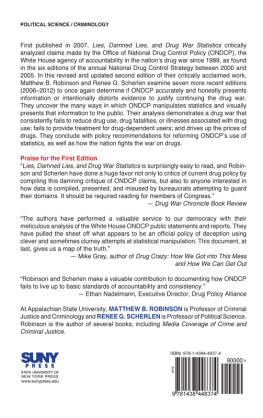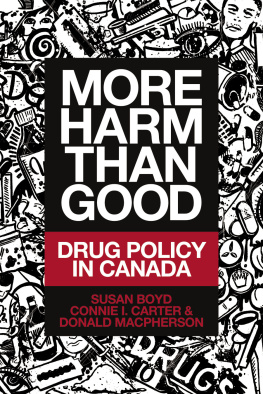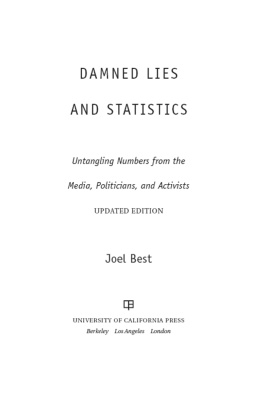Lies, Damned Lies,
and Drug War Statistics
Second Edition
Lies, Damned Lies,
and Drug War Statistics
A Critical Analysis of Claims Made by the
Office of National Drug Control Policy
Second Edition
Matthew B. Robinson
and
Renee G. Scherlen
Published by State University of New York Press, Albany
2014 State University of New York
All rights reserved
Printed in the United States of America
No part of this book may be used or reproduced in any manner whatsoever without written permission. No part of this book may be stored in a retrieval system or transmitted in any form or by any means including electronic, electrostatic, magnetic tape, mechanical, photocopying, recording, or otherwise without the prior permission in writing of the publisher.
For information, contact State University of New York Press, Albany, NY
www.sunypress.edu
Production by Eileen Nizer
Marketing by Michael Campochiaro
Library of Congress Cataloging-in-Publication Data
Robinson, Matthew B.
Lies, damned lies, and drug war statistics : a critical analysis of claims made by the Office of National Drug Control Policy / Matthew B. Robinson and Renee G. Scherlen. Second edition.
pages cm
Includes bibliographical references and index.
Summary: Revised and updated edition that analyses how the Office of National Drug Control Policy employs statistics to misleadingly claim the War on Drugs is a successProvided by publisher.
ISBN 978-1-4384-4837-4 (hardcover : alk. paper)
ISBN 978-1-4384-4838-1 (pbk. : alk. paper)
1. United States. Office of National Drug Control Policy. 2. Drug controlUnited States. 3. Drug controlUnited StatesStatistics. 4. Drug abuseGovernment policyUnited States. 5. Drug abuseUnited StatesStatistics. I. Scherlen, Renee G., 1962 II. Title.
HV5825.R63 2013
363.450973dc23
2012048345
10 9 8 7 6 5 4 3 2 1
Contents
List of Illustrations
Tables
Figures
Preface to the Second Edition
There are three kinds of lies: lies, damned lies, and statistics.
Mark Twain
Actually, it is not fair to say that statistics are lies (as Mark Twain claimed), or that statistics lie (as so many others often claim). It is more accurate to say that statistics can be used to lie. That is, they can be manipulated to support any argument, including a knowingly false argument.
In the first edition of this book, we presented overwhelming evidence that the lead federal agency responsible for national drug control policythe Office of National Drug Control Policy (ONDCP)regularly and intentionally presented faulty statistics to make knowingly false arguments about the (in)efficacy of the drug war.), ONDCP was always only telling part of the story about the drug war. We illustrated specifically how ONDCP selectively presented those statistics that suggested we were meeting the stated goals of national drug control policy while ignoring statistics that showed the opposite. We also showed how some ONDCP claims simply did not match the data.
This matters. Actually, it matters a lot. People use and read statistics every day, and, from them, we get our sense of the world and everything in it. When people use statistics to mislead, we get a false sense of the world and the many things in it. Our argument was that one main reason the drug war rages ondespite pretty clear evidence of its failuresis that citizens and political leaders alike have consistently been misled by ONDCP.
The first edition of this book was very well received, especially by drug war reformers (i.e., people working to change the drug war). Its publication There, we presented numerous examples of misleading statistics and inappropriate use of statistical figures depicted by ONDCP over the years. Dr. David Murray, chief scientist at ONDCP, was present to rebut the findings. He denied the claim that ONDCP manipulates evidence and skews data and vigorously defended ONDCP, its Strategy reports, and especially Americas warlike approach to drug control.
We had hoped the publication of the first edition of the book, as well as our encounter with one of ONDCPs top officials, would lead to significant change in how ONDCP uses and presents data. Unfortunately, that has not happened. Under President Barack Obama, ONDCP has changed how it presents data; yet, it is still not presenting and analyzing all the available data in order to provide a thorough and honest assessment of national drug control policy.
Much has happened across the globe in terms of drug policy since the publication of our book. For example, on June 2, 2011 the Global Commission on Drug Policy issued a report on the global drug war.
We believe that our work follows the principles and recommendations of the Global Commission on Drug Policy. Our analysis evaluates the credibility and validity of the claims made by ONDCP. We hope to advance the efforts here in the United States to engage a serious review of US drug war policies and a sober consideration of alternatives.
The Global Commission on Drug Policy is not the only group to espouse a desire for clear and accurate information. The Obama administrations first National Drug Control Strategy stated: Science should help inform policy and rigorously evaluate its effects. This can be possible only with near real-time information on drug use patterns, associated problems, and the results of previously implemented policies.
It is our hope that this second edition facilitates the ONDCPs quest to disseminate data that are accurate, reliable, and unbiased, as well as provide feedback about the agencys intention to present information in an accurate, then our book needs to be widely read in the agency.
In this book, we present a study of seven years of the National Drug Control Strategy (20062012) and the main claims contained therein (the first edition of the book reviewed data from the 20002005 Strategy reports). We are primarily interested in how ONDCP uses statistics to make claims about the nations drug war, and whether these claims are accurate, honest, transparent, and justifiable. Because ONDCP regularly presents graphs and figures to depict important drug war statistics, we also critically analyze how it chooses to present the data visually.
Like most second editions, we update the information from the first edition of the book. In our case, we expand the scope of our analysis to include Strategy reports written after the original publication date. Additionally, we have worked to streamline the analysis provided. By lengthening the time line and consolidating the analysis, a clearer picture of drug policy continuity as well as change becomes evident. For instance, although presidential rhetoric often suggests major transformations in policy, a close read of National Drug Control Strategy reports reveals modest, marginal modifications at best. Furthermore, this second edition reveals that the US drug war continues unabateddespite rejection of the term drug war by the Obama administration. Perhaps most disappointing, our most recent research indicates that the ONDCP still does not offer an accurate, long-term, systematic evaluation of drug policy. Thus, we conduct our own long-term and fair analysis of the drug war in this book.
Overview of the Book
This book is divided into three main parts. In Part I, we introduce the main issues of the book and provide a solid yet brief background on the major issues pertaining to Americas war on drugs. In , we briefly trace the history of Americas drug war at home and abroad, noting the establishment of major drug war agencies, identifying key laws, and discussing significant events. We also provide an important foundation through a brief discussion of issues such as the goals of the drug war, the agencies that fight the drug war, and the drug war budget. Here we provide some background and context for Americas drug war.










